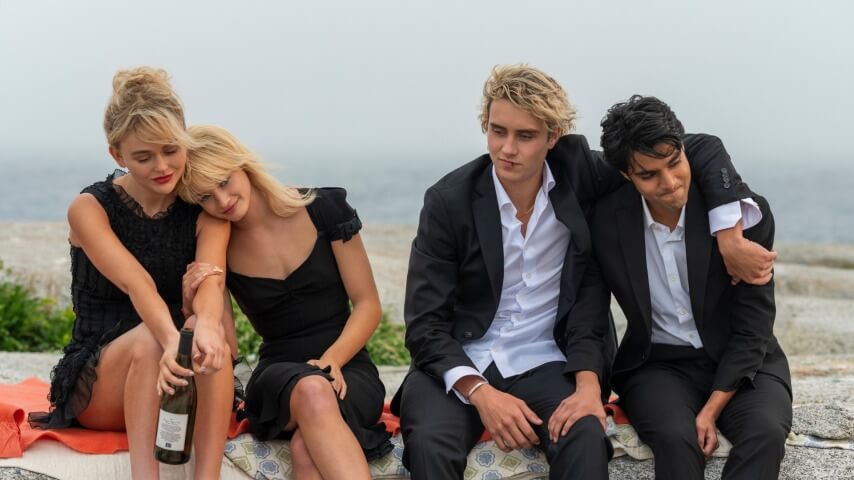YA thriller We Were Liars skims over big ideas in favor of meandering subplots
Prime Video's new series unfolds at a wealthy family's summer getaway.
Photo: Jessie Redmond/Prime Video
Fairytale allegories threaten to overpower We Were Liars, which centers on Cadence Sinclair (Emily Alyn Lind), who repeatedly dubs her rich family’s holiday island a mythical place where summer never ends (ah, the sweet delusions of being 16). The “king,” her oligarch grandfather, rules with an iron fist, while his three princesses (that is, grown daughters) strive for his attention and approval. After all, his favorite will inherit the realm and gold. Meanwhile, grandchild Cadence, along with her two cousins and a sweet love interest, wants to frolic in the sea, play Scrabble, throw ragers, and figure out a complex romantic situation. Despite her mother’s persistent reminders, she’s still naive about how money factors into her carefree life. But she’s forced to grow up after a horrible, mysterious incident.
Liars jumps back and forth between two consecutive years. During one summer, Cadence suffered an injury so tragic that it wiped her memory of what caused it. The following year, she returns to a changed Beechwood Island, hoping to put the puzzle pieces together to understand her loved ones’ strange behaviors. What they’re hiding from her and why becomes the show’s weighty hook. But frustratingly, Liars fails to delve into the themes of generational wealth, privilege, and patriarchy that this tale is tied to. And while the story’s connection to fairytales is strong on paper—emphasizing morals, rich versus poor, young women fighting for independence, and so on—the overlong episodes, near-constant narration, and some flat performances make the project essentially crumble (its shocking finale notwithstanding).
Series co-creators Julie Plec (The Vampire Diaries) and Carina Adly Mackenzie (Roswell, New Mexico) try to package their frothy CW sensibilities with heavier issues. But adapting the big twists of E. Lockhart’s bestselling novel into eight uneven episodes results in a TV show that’s unsure of where it fits in and how to convincingly relay its message about the corruption of power. Liars is partially a lighthearted drama in which Cadence, Gat (Shubham Maheshwari), Johnny (Joseph Zada), and Mirren (Esther McGregor) get caught up in love triangles and silly fights, all while wearing swimsuits on the beach, attending Fourth of July parties, and participating in the island’s annual lemon hunt. (Yes, everyone’s donned in yellow for the latter.) That breeziness is similar to Prime Video’s YA hit The Summer I Turned Pretty, which releases its final season next month. But not everything is sunshine and rainbows here either.
The Liars, as the show’s core quartet calls itself, have an intense coming-of-age. That’s mainly courtesy of a villain in the vein of Succession‘s Logan Roy and Yellowstone‘s John Dutton. But the corporate mogul Harris Sinclair (David Morse), the family’s bigoted, larger-than-life leader, comes off much more like a caricature. His only weakness seems to be his loving wife. And his strength is to expertly manipulate his adult daughters (played by Mamie Gummer, Caitlin FitzGerald, and TVD‘s Candice King) so they compete, don’t stand up for themselves, and act incredibly childish. The three women are willing to be puppets under the thumb of their traditional father and push their adolescents to follow along so their endowments aren’t taken away.
